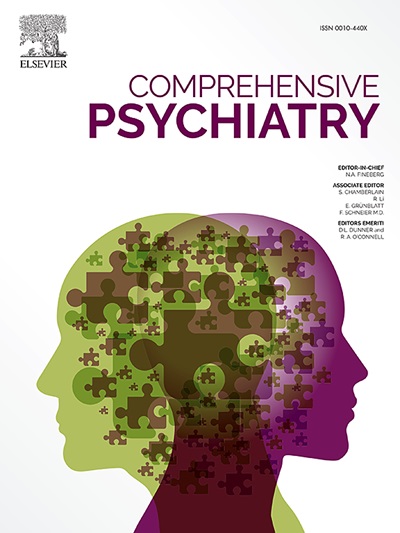The impact of events scale-revised (IES-R): Validation of the Ukrainian version
IF 4.2
2区 医学
Q1 PSYCHIATRY
引用次数: 0
Abstract
Background
The aftermath of warfare in Ukraine has witnessed traumatic experiences emerge as a significant concern. This highlights the need for strengthened secondary prevention strategies targeting trauma and stress-related disorders. Providing mental health professionals with tools to support refugees is crucial. The Impact of Events Scale – Revised (IES-R) stands out as the prevalent early diagnostic and clinical assessment tool for measuring the traumatic stress symptoms. However, this questionnaire has yet to be psychometrically adapted to the Ukrainian linguistic and cultural context.
Objective
This study sought to verify the reliability and validity of the Ukrainian version of the Impact of Events Scale – Revised for adult Ukrainian refugees.
Method
A psychometric evaluation was conducted within broader longitudinal research on refugee mental health. The study incorporated a convenience sample of 584 Ukrainian refugees located in Germany. The Ukrainian IES-R's factorial structure underwent validation using CFA with the DWLS estimator. Internal consistency was ascertained using both Cronbach's α and MacDonald's ω. The convergent and divergent validity of the questionnaire were established through Pearson's correlation coefficient. The DIF analysis evaluated diagnostic disparities between groups of respondents identifying as women and men. The ICC, derived from a two-way mixed ANOVA model, and Pearson's correlation coefficients were employed to gauge the test-retest reliability of the IES-R over an 8-month interval between the two data collection waves.
Results
The Ukrainian version of the IES-R retains a three-factor, classification-free structure, with a modification of item No. 12 being shifted to the Hyperarousal subscale. Confirmatory metrics (CMIN/DF = 2.874, RMSEA = 0.049, SRMR = 0.065, CFI = 0.977, TLI = 0.974) bolster the model's fit. Consistency coefficients (α, ω) for each subscale ranged from 0.75 to 0.84, with the IES-R's overall values being ω = 0.92 and α = 0.91. The IES-R total score and individual factor values displayed significant (moderate to high) correlations with PSS-10 and either weak or inverse correlations with SWLS, TIPI, and ZTPI-S, aligning with expectations. The test-retest measures showed low temporal stability with an ICC of 0.206 for the total score and a moderate correlation (r = 0.412, p < 0.01), indicating the questionnaire assesses trauma and stressor-related symptoms rather than underlying traits.
Conclusion
The data reveal the IES-R as an efficacious diagnostic tool to discern trauma-induced distress in adult Ukrainian refugees. Given its robust psychometric properties, the IES-R is relevant for screening wartime impact.
事件规模修订的影响(IES-R):乌克兰版本的验证
乌克兰战争后的创伤经历成为一个重大问题。这突出表明需要加强针对创伤和压力相关疾病的二级预防战略。为心理健康专业人员提供支持难民的工具至关重要。事件影响量表-修订(IES-R)是衡量创伤应激症状的流行的早期诊断和临床评估工具。然而,这个问卷还没有心理计量适应乌克兰的语言和文化背景。目的本研究旨在验证乌克兰版事件影响量表-修订后的乌克兰成年难民的信度和效度。方法在难民心理健康的更广泛的纵向研究中进行心理测量评估。这项研究纳入了居住在德国的584名乌克兰难民的方便样本。乌克兰IES-R的析因结构使用CFA和DWLS估计器进行验证。内部一致性采用Cronbach's α和MacDonald's ω确定。通过Pearson相关系数确定问卷的收敛效度和发散效度。DIF分析评估了女性和男性受访者群体之间的诊断差异。采用双向混合方差分析模型的ICC和Pearson相关系数来衡量IES-R在两个数据收集波之间的8个月间隔内的重测信度。结果乌克兰版本的IES-R保留了三因素,无分类结构,并将第12项修改为高唤醒子量表。验证性指标(CMIN/DF = 2.874, RMSEA = 0.049, SRMR = 0.065, CFI = 0.977, TLI = 0.974)支持模型的拟合。每个子量表的一致性系数(α, ω)范围为0.75 ~ 0.84,IES-R的总体值为ω = 0.92, α = 0.91。IES-R总分和个体因子值与PSS-10呈显著(中高)相关,与SWLS、TIPI和ZTPI-S呈弱相关或负相关,与预期一致。重测结果显示时间稳定性较低,总分的ICC为0.206,相关性中等(r = 0.412, p <;0.01),表明问卷评估的是创伤和压力相关的症状,而不是潜在的特征。结论IES-R是识别乌克兰成年难民创伤性痛苦的有效诊断工具。鉴于其强大的心理测量特性,IES-R与筛选战时影响有关。
本文章由计算机程序翻译,如有差异,请以英文原文为准。
求助全文
约1分钟内获得全文
求助全文
来源期刊

Comprehensive psychiatry
医学-精神病学
CiteScore
12.50
自引率
1.40%
发文量
64
审稿时长
29 days
期刊介绍:
"Comprehensive Psychiatry" is an open access, peer-reviewed journal dedicated to the field of psychiatry and mental health. Its primary mission is to share the latest advancements in knowledge to enhance patient care and deepen the understanding of mental illnesses. The journal is supported by a diverse team of international editors and peer reviewers, ensuring the publication of high-quality research with a strong focus on clinical relevance and the implications for psychopathology.
"Comprehensive Psychiatry" encourages authors to present their research in an accessible manner, facilitating engagement with clinicians, policymakers, and the broader public. By embracing an open access policy, the journal aims to maximize the global impact of its content, making it readily available to a wide audience and fostering scientific collaboration and public awareness beyond the traditional academic community. This approach is designed to promote a more inclusive and informed dialogue on mental health, contributing to the overall progress in the field.
 求助内容:
求助内容: 应助结果提醒方式:
应助结果提醒方式:


